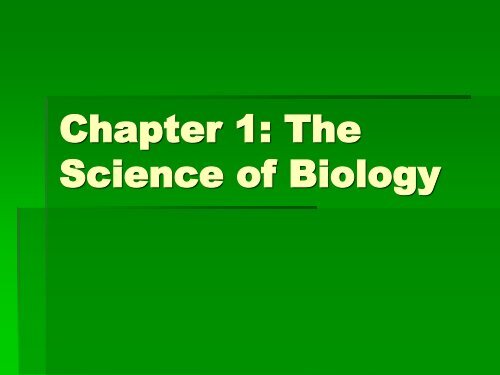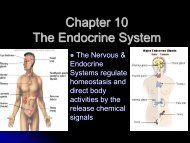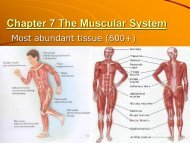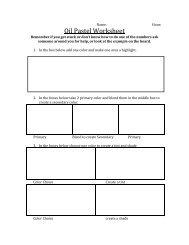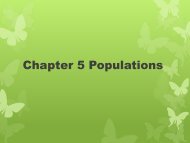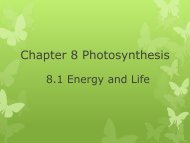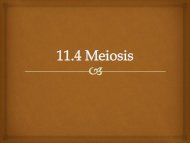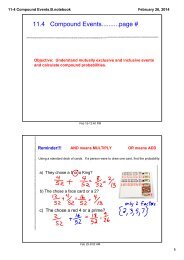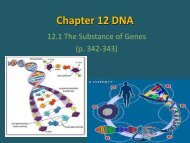Chapter 1 The Science of Biology 22012.pdf
Chapter 1 The Science of Biology 22012.pdf
Chapter 1 The Science of Biology 22012.pdf
You also want an ePaper? Increase the reach of your titles
YUMPU automatically turns print PDFs into web optimized ePapers that Google loves.
<strong>Chapter</strong> 1: <strong>The</strong><br />
<strong>Science</strong> <strong>of</strong> <strong>Biology</strong>
1.1 What is <strong>Science</strong><br />
<strong>Science</strong>: organized evidence to study<br />
natural world<br />
• Way <strong>of</strong> knowing natural world<br />
• Goal: To gather info-look for pattern<br />
• Ever changing ex: technology
Scientific Methodology<br />
1. Observation: use senses to gather info<br />
2. Inference: logical interpretation based<br />
on prior knowledge<br />
3. Hypothesis: testable educated<br />
explanantion
• 4. Controlled Experiment: hypothesis<br />
tested using only 1 changing variable<br />
• Independent Variable (IV): changed variable<br />
• Dependent Variable (DV): respond to IV, usually<br />
a measurement ex: mm<br />
• Control group: exposed to same conditions<br />
WITHOUT the IV
5. Data: recorded observations<br />
• Quantitative: numbers usually measured<br />
• Qualitative: descriptive characteristics not<br />
counted
6. Conclusion<br />
• Either support, refute (not support), or cause<br />
revisions <strong>of</strong> hypothesis
1.2 <strong>Science</strong> in Context<br />
1. Where <strong>Science</strong> ideas come from:<br />
• Scientific Attitude: curiosity,<br />
skepticism, open-mindedness,<br />
creativity<br />
• Practical Problems: observed<br />
issues lead to questions=<br />
experimentation<br />
• Technology: gather data in new ways
2. Communicating Results:<br />
• Peer Review: Lab reports are shared, tested<br />
evaluated by peers<br />
• Sharing New Information: peer reviews generate<br />
new ideas
3. Scientific <strong>The</strong>ory<br />
• <strong>The</strong>ory: ties several related hypotheses<br />
together<br />
• Thoroughly tested<br />
• Dominant view<br />
• May be revised with new evidence
4. <strong>Science</strong> and Society: influences and is<br />
influenced by society!<br />
• Ethics and Morality: not included in pure science<br />
(Fetal alcohol experimentation)<br />
• Bias: a personal, not scientific, viewpoint
1.3 Studying Life<br />
• Key Terms<br />
• <strong>Biology</strong>: Study <strong>of</strong> life/living world<br />
• Biologist: Person using scientific method to<br />
study living things
Characteristics <strong>of</strong> Living<br />
things<br />
• Have cells<br />
• Universal Genetic Code—DNA<br />
• Obtain/use materials & energy: metabolism<br />
• Grow & develop<br />
• Reproduce—most important<br />
• Respond to environment (stimulus)<br />
• Maintain stable internal env’t (homeostasis—<br />
balanced)<br />
• Group can change over time (evolve)
Big Idea<br />
Cellular basis <strong>of</strong> life<br />
Information and heredity<br />
Description<br />
Living things are made <strong>of</strong> cells.<br />
DNA is the universal code<br />
Matter and Energy<br />
Growth, development, and reproduction<br />
Life requires matter that provides raw materials,<br />
nutrients, and energy.<br />
All living things reproduce<br />
Homeostasis<br />
Evolution<br />
Living things maintain a relatively stable internal<br />
environment.<br />
Living things change over time<br />
Structure and Function<br />
Each major group <strong>of</strong> organisms has evolved<br />
structures that make particular functions<br />
possible.<br />
Unity and Diversity <strong>of</strong> Life<br />
All living things are fundamentally similar at the<br />
molecular level.<br />
Interdependence <strong>of</strong> Nature<br />
All forms <strong>of</strong> life on Earth are connected into a<br />
biosphere—a living planet.<br />
<strong>Science</strong> as a way <strong>of</strong> knowing<br />
Through observations, questions and<br />
experimentation
Fields <strong>of</strong> <strong>Biology</strong>:<br />
• Based on type <strong>of</strong> organism<br />
• Different levels <strong>of</strong> organization<br />
• molecules—cells—group <strong>of</strong> cells—<br />
organism—population—community—<br />
ecosystem--biosphere


